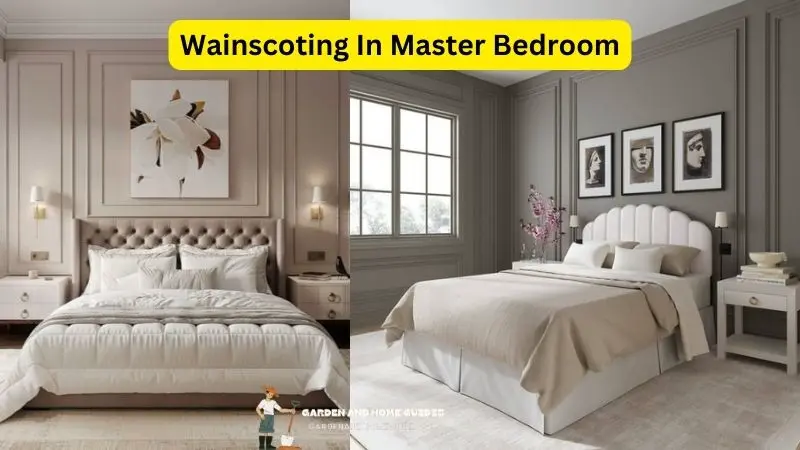Interior
Wainscoting In Master Bedroom
The master bedroom, a sanctuary of rest and rejuvenation, deserves an ambiance that reflects its purpose. While modern trends often favor minimalist aesthetics, there’s a timeless allure in incorporating traditional elements that add depth, character, and a touch of sophistication.
One such element, often overlooked in contemporary design, is wainscoting. This architectural detail, with its origins in the 16th century, has the power to elevate a bedroom from ordinary to extraordinary, creating a space that feels both welcoming and refined.
Let’s learn more about wainscoting in master bedroom with gardenandhomeguide.com in the article below!
Understanding Wainscoting
Wainscoting, a form of decorative paneling that traditionally spans the lower part of a wall, boasts a storied history deeply rooted in both function and style. Initially conceived for practical reasons—shielding walls from wear and tear while fortifying insulation against drafts—wainscoting has transcended its utilitarian origins to become a hallmark of refinement and prestige.
Throughout the centuries, it has graced the interiors of majestic palaces and opulent residences, transforming ordinary spaces into showcases of architectural grace.
Today, wainscoting remains as compelling as ever, revered for its timeless appeal and adaptability. It serves not only as a protective barrier but also as a design canvas, offering limitless possibilities to enhance any interior aesthetic.
Whether installed in a classic, paneled form reminiscent of historic manors or reimagined with modern materials and patterns, wainscoting continues to captivate homeowners and designers alike, embodying a blend of heritage and contemporary flair that endures across generations.
The Benefits of Wainscoting in Master Bedroom
In the context of a master bedroom, wainscoting offers a myriad of benefits that extend far beyond its undeniable aesthetic appeal. Its ability to transform a space is multifaceted, impacting both the visual and functional aspects of the room.
One of the primary advantages of wainscoting in a master bedroom is its capacity to break up large expanses of wall, adding texture and depth to what might otherwise be a monotonous surface. This added dimension can significantly enhance the room’s overall ambiance, making it feel more dynamic and engaging.
This effect is particularly beneficial in bedrooms with high ceilings, where the vast vertical space can sometimes feel overwhelming. Wainscoting helps to create a sense of balance by visually anchoring the lower portion of the walls, thereby fostering an atmosphere of coziness and intimacy. This architectural feature effectively scales down the room’s perceived height, making it feel more inviting and well-proportioned.
Moreover, wainscoting serves as an excellent backdrop for artwork and other decorative elements. By providing a structured and visually appealing canvas, it allows for the creation of a gallery-like display that can elevate the room’s design.
Whether showcasing a collection of framed photographs, paintings, or other art pieces, the wainscoting enhances the visual interest of the space, drawing the eye and creating focal points that add character and personality to the bedroom.
Additionally, wainscoting can be customized to complement various design styles, from traditional to contemporary. Its versatility allows homeowners to choose from a range of materials, colors, and patterns to suit their personal taste and the overall decoration of the master bedroom. This adaptability ensures that wainscoting can seamlessly integrate into any design scheme, enhancing the room’s aesthetic without overwhelming it.
In essence, wainscoting in a master bedroom is not merely a decorative element; it is a strategic design choice that enhances the room’s visual appeal, balances its proportions, and provides a sophisticated backdrop for personal expression through artwork and decoration. By incorporating wainscoting, one can transform a master bedroom into a harmonious blend of elegance and comfort, creating a sanctuary that is both beautiful and functional.
Choosing the Right Style
The choice of wainscoting style is crucial in achieving the desired effect.
Traditional Wainscoting
Traditional wainscoting, typically characterized by raised panels and intricate molding, evokes a sense of classic elegance and grandeur. This style is particularly well-suited to bedrooms with ornate furniture and a formal ambiance.
Contemporary Wainscoting
For a more contemporary feel, consider using flat panels with simple molding, or even incorporating geometric patterns for a modern twist.
Material Selection
The material used for wainscoting also plays a significant role in shaping the overall aesthetic.
Traditional Materials
Traditional options include wood, particularly hardwoods like oak, cherry, or walnut, which lend a warm and natural feel.
Modern Materials
However, modern materials like MDF (medium-density fiberboard) or even PVC (polyvinyl chloride) offer durable and cost-effective alternatives. These materials can be painted or stained to match the existing décor, allowing for greater flexibility in achieving the desired look.
Height and Placement
The height of the wainscoting is another design consideration.
Traditional Height
Traditionally, wainscoting extends to chair rail height, approximately 36 inches from the floor.
Adjusting Height
However, this can be adjusted to suit the room’s proportions and the desired visual impact. In smaller bedrooms, a lower wainscoting height can create a sense of spaciousness, while in larger rooms, a higher wainscoting can add a touch of grandeur.
Integrating Wainscoting into the Design Scheme
The integration of wainscoting within the bedroom’s overall design scheme is essential for a cohesive and harmonious look.
Color Palette
The color palette should complement the wainscoting, with contrasting shades adding depth and visual interest. For instance, a light-colored wainscoting can be paired with a darker wall color, creating a sophisticated and elegant ambiance. Alternatively, a bold accent wall with wainscoting in a complementary shade can create a focal point in the room.
Furniture and Accessories
The choice of furniture and accessories is equally important. In a bedroom with wainscoting, opt for pieces that complement the style and create a sense of unity. For a traditional wainscoting, consider antique furniture with intricate carvings or upholstered pieces with luxurious fabrics. For a more contemporary wainscoting, sleek and minimalist furniture with clean lines will create a balanced look.
Practical Benefits of Wainscoting
Beyond its aesthetic appeal, wainscoting offers practical benefits that enhance the functionality of the master bedroom.
Concealing Imperfections
The installation of paneling serves a dual purpose: it enhances the aesthetic appeal of a room while also providing a practical solution for concealing imperfections in the walls. This technique is particularly advantageous in older homes, where walls often display signs of wear and tear, such as uneven surfaces, cracks, or visible repairs. By covering these flaws, paneling creates a smooth and polished surface that dramatically improves the overall appearance of the space.
In addition to its cosmetic benefits, paneling can also contribute to the structural integrity of the walls. It acts as an additional layer of protection, shielding the underlying wall from further damage and potential deterioration. This added durability is especially valuable in homes that have experienced significant settling or have been subjected to frequent repairs over the years.
Moreover, paneling offers versatility in design, allowing homeowners to choose from a variety of materials, finishes, and styles to match their personal preferences and the existing décor of their home. Whether opting for classic wood paneling, contemporary wainscoting, or modern composite materials, this decorative feature can seamlessly blend with or enhance any interior design scheme.
Protection from Damage
Additionally, wainscoting can serve as a protective barrier, preventing damage to the walls from furniture or everyday wear and tear.
Enhancing Acoustics
Additionally, wainscoting serves a dual function by not only enhancing the aesthetic appeal of a room but also acting as a robust protective barrier for the walls. This feature is especially valuable in high-traffic areas of the home, such as hallways, dining rooms, and living spaces, where walls are more susceptible to damage from furniture, children, and pets.
The lower portion of the wall, which is typically covered by wainscoting, is the area most prone to scuffs, scratches, and dents caused by everyday activities. By installing wainscoting, you can effectively shield this vulnerable section from the inevitable wear and tear that comes with daily life.
The durable materials used in wainscoting, such as wood, MDF, or PVC, are designed to withstand impacts and abrasions, ensuring that your walls remain pristine and unblemished over time.
Furthermore, wainscoting offers a stylish solution to wall protection, adding texture, depth, and architectural interest to any room. It can be customized with various designs, from simple beadboard to elaborate raised panels, allowing homeowners to create a look that complements their interior décor while providing practical benefits.
Whether painted in a contrasting color to create a striking visual effect or stained to highlight the natural beauty of the wood, wainscoting enhances the overall design of the space.
Cost and Investment
While wainscoting can be a significant investment, its long-lasting durability and timeless appeal make it a worthwhile addition to any master bedroom. The cost of installation will vary depending on the size of the room, the complexity of the design, and the materials used. However, the enhanced aesthetic and functional benefits of wainscoting far outweigh the initial expense.
Conclusion
In conclusion, wainscoting offers a unique opportunity to elevate the master bedroom from a simple space to a sanctuary of sophistication and timeless elegance. Its versatility allows for customization to suit various styles and preferences, while its practical benefits enhance the functionality and comfort of the room.
Whether you choose traditional or contemporary wainscoting, the impact on the overall ambiance is undeniable, creating a space that feels both inviting and refined. As you embark on your master bedroom design journey, consider the transformative power of wainscoting, a timeless element that will add a touch of elegance and character to your personal sanctuary.






